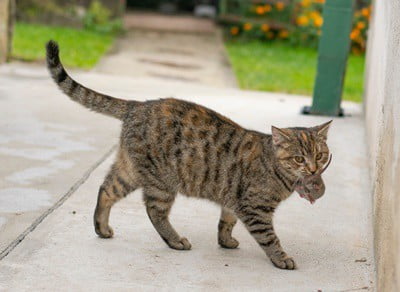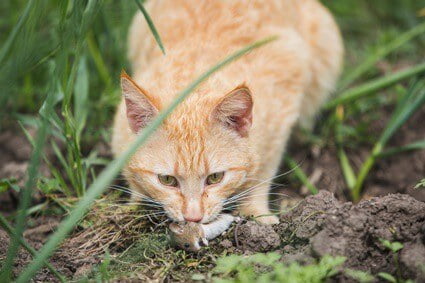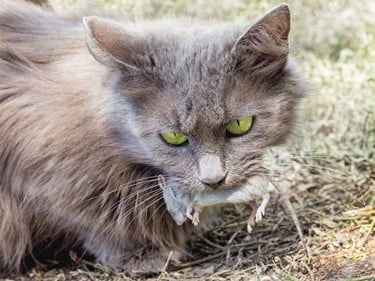If you have a rodent problem in your home, you have two choices. Call in an exterminator or get a cat. Naturally, the second option comes with many benefits. Your four-legged pest control agent will also offer fun and companionship.
Some feline breeds make more effective mousers than others. The American Shorthair, Persian, Siamese, Manx, Burmese, Turkish Angora, Chartreux, Siberian, Maine Coon, and Japanese Bobtail are considered the best hunters. Every cat is unique, so you’ll still need to check that the cat has a killer instinct.
If you adopt a cat to act as a mouser, you bring a new family member into your home. You must treat the cat accordingly. If looking for a pet and a solution to your pest problem, a cat can be the answer.
Why Do Cats Catch Mice?
Cats are born predators. Almost all felines live with an ingrained instinct to stalk and capture smaller, fast-moving prey. Such instincts explain why so many feline toys center around hunting and pouncing games.
As explained by People and Nature, this is often considered a concern. Feral and domesticated felines alike can decimate wildlife populations, especially birds. Nobody can or should blame a cat for such behavior. Instinct is a powerful thing that cannot be ignored.
When it comes to cats catching mice, few people have any such qualms. Rodents are often considered verminous pests. If a cat is willing to chase them out of a home, so much the better.
Why are cats so good at catching mice, though? In simple terms, mice are easy prey. Cat vision revolves around movement. The rapid, skittering movements of a mouse will always capture attention. A cat’s keen senses of smell and hearing will also make mice easy to locate.
As mice are smaller than cats, they are easy to stalk and pounce upon. Once this has occurred, a mouse is rarely strong enough to fight off a cat. Cats can quickly tire a mouse before killing it. The complete process sates the feline instinct to hunt.
How Do Cats Catch Mice?
Active hunting involves the previously profiled stalking, wiggling, and pouncing. The cat will detect a mouse and silently follow it. The cat will watch the mouse intently. Once close enough, the cat will launch itself at its prey.
Once the cat lands on the mouse, it will start batting the rodent with its paws. While this looks like a cruel game, but the cat is just protecting itself. Such movement exhausts the mouse, making it less likely to bite the cat in retaliation.
When it’s ready, the cat will complete its kill. The mouse may be disemboweled with the claws or have its neck snapped with the teeth. A cat with a particular bloodlust may bite the head of a mouse clean off.
This stalking approach is exhausting for cats, requiring a lot of movement and energy. As a result, some cats take a more passive approach. They will learn where mice hide and lie in wait. If a mouse emerges from its hole, the cat will immediately attack.
How Many Mice Do Cats Kill a Year?
There is no precise answer to this question. It depends on a range of factors, including:
- Temperament and breed of the cat. Not all cats enjoy hunting mice
- Mouse population in an area. More mice mean greater hunting opportunities
- Hunger. Feral cats kill more than domesticated felines as they cannot rely on humans for food
- Age. As cats get older, they struggle with the physical demands of hunting
According to Nature Communications, domesticated cats that roam outside kill up to 22 billion mammals every year. That is not just mice, though. Some cats will hunt larger prey, including shrews, rats, and even rabbits or squirrels.
How Many Mice Do Cats Eat in a Day?
Again, this is variable. It’s common for a domesticated cat not to eat any mice. Some owners consider this a relief. Eating mice can make cats sick, as small animals carry disease.
Feral cats are likelier to eat mice for nourishment and protein. If a cat is only eating mice, it will need to average around eight a day to sustain itself. Cats need 240 calories each day to thrive, and a single mouse offers around 30 of these.
Only the most vibrant, energetic cat will have the energy to hunt eight mice a day, though. Most felines will supplement their diet with other, slower prey.
Why Do Cats Catch Mice and Not Eat Them?
As discussed, cats hunt to satisfy their natural urges and drives. Just because your cat catches a mouse, that does not mean it will eat. A well-fed pet cat will rarely consume its prey.
Instead, such a cat will often leave the mouse corpse where it completed the kill. Alternatively, the cat may take the body back to familiar territory as a trophy or present it as a gift to an owner.
This is one of the least appealing elements of ownership. Resist any urge to react with disgust. Your cat expects you to praise its hunting prowess. It may even be gifting you the mouse as it worries you cannot hunt and feed yourself.
Do All Cats Catch Mice?
All cars are born with hunting instinct, but not all cats actively embrace these urges. Some domesticated cats are too lazy to hunt. Others prefer to play. Your cat may be soft and loving, choosing to befriend mice rather than hunt and kill them.
Some cat breeds make more natural mousers than others. We will list those out in just a moment. Even so, all cats have their own personality. Do not assume the cat will be a cold-blooded killer just because a breed is on our list.
When seeking a mouser, visit the cat ahead of time armed with hunting toys. Play with the cat and see how it reacts. If the cat actively engages with laser pointers, fishing rods, or wind-up toys, it will likely be an effective mouser. If it remains indifferent, look elsewhere.

What Kind of Cats Make the Best Mousers?
We’ll now look at breeds of domesticated felines considered to make the best mousers. When looking for a cat to deal with a rodent infestation, these should be your priority.
American Shorthair
The American Shorthair initially arrived in the U.S. on the Mayflower. Part of this decision was down to superstition. In the 18th Century, people believed that cats protected ships from storms. More importantly, these cats are also natural hunters. Sailors used them to keep the rodent population under control.
These cats are calm and docile around humans but ruthless when prey enters their sights. The American Shorthair is a low-maintenance and independent breed. It’s the ideal choice for a novice owner with a need for a mouser.
Burmese
We mentioned previously that many domesticated cats do not eat mice. That does not apply to the Burmese, a gluttonous breed. This cat will never hesitate to locate a rodent population and eat its fill.
The Burmese is also a loving and affectionate breed of cat that loves human companionship. A Burmese makes a great family pet and mouser if you have the time to meet its needs. Burmese cats will seek constant attention and entertainment.
Chartreux
The Chartreux is a rare breed of cat, especially in the U.S. As a result, such a pet will attract a hefty price tag from a breeder. This is a shame, as these cats are not just beautiful and loving. They are also skilled hunters.
Chartreux cats tend to develop slowly, and it may be three years before this breed reaches full maturity. When it does so, the Chartreux is a muscular, energetic cat that loves to stalk prey. If you can find a Chartreux, consider adding one to your family.
Japanese Bobtail
The Japanese Bobtail is not Japanese at all. These social cats hail from Korea, where they were bred specially to hunt mice. The silk factories of Korea often struggled with rodents before the Japanese Bobtail entered the scene.
Intelligent and affectionate, Japanese Bobtail cats thrive most in a busy home with constant companionship. They can also be a little bossy, so think carefully before pairing this cat with another breed. You’ll appreciate this dominance when it’s time to hunt, though.
Maine Coon
Like the American Shorthair, Maine Coons have been a resident of the USA since the days of the pilgrims. These gentle giants are much bigger than most cats but adore human company. They’re basically giant teddy bears unless you’re a mouse.
The large, muscular frame of the Maine Coon ensures that it will make short work of any rodent foolhardy enough to enter your home. These cats are popular on farms for this reason. If you have the space for a Maine Coon in your home, you’ll have a friend for life.
Manx
If you are unfortunate enough to have a rodent infestation and a cat allergy, a Manx is a possible answer. While no cat is truly hypoallergenic, this breed is closest to such a status.
The Manx is also a born hunter. Many farmers across the world rely upon Manx cats to chase rodents away from their crops. The same approach can reap rewards in a home. Just know that the Manx can be wary around strangers and needs a calm home to thrive.
Persian
Persians have a reputation as the laziest breed of cat. To an extent, this is true. You’ll often find your Persian lounging around your home, seemingly without a care in the world. Appearances can be deceptive. Persians are some of the most effective mousers around.
In essence, a Persian cat will move when it has good reason to do so. The chance to catch a mouse offers this motivation in spades. Your Persian will move like lightning if it spots an intruder and return to dozing on the couch as though nothing happened.
Siamese
If you’d prefer a dog but need a cat for mousing, a Siamese is an ideal compromise. These cats are playful, affectionate, and loud. Siamese cats also love to hunt. They need near-constant attention, though, so do not choose a Siamese if you are rarely home.
Siberian
Do not be fooled by the bulky size of a Siberian. These cats may be on the chunky side, but they are effortlessly agile. Such dexterity comes in handy when hunting. Only the most determined mouse will escape the attention of a Siberian.
Siberian cats develop slowly, often acting like kittens for up to five years. That is great for hunting, but it will involve a substantial investment in time to play and manage risky behavior. Do not take on a Siberian unless you’re sure you can handle the responsibility.
Turkish Angora
Unlike most popular breeds of pet, the Turkish Angora did not originate in captivity. While domesticated, these cats have their origins in nature, hailing from the European nation that bears their name.
Due to this wild heritage, the Turkish Angora is an excellent hunter. A Turkish Angora will quickly bond with human owners but will always prioritize the opportunity to capture live prey.
Are Male or Female Cats Better Mousers?
Unspayed female cats are widely believed to make the most effective mousers. Female cats are proud, protective mothers. Most queens will teach their kittens how to hunt at an early age. Doing so keeps the instinct sharp and vigilant.
Male cats are still effective hunters. Tomcats that have not undergone neutering will have bags of energy and potential aggression. Such vigor must be directed somewhere. Mice are likely to be the recipients of unwanted attention.
If seeking a cat to act as a mouser, give serious consideration to a female. If you do not plan to breed the cat, adopt a queen that has previously birthed at least one litter. She is likeliest to deal with your infestation.

Do Cats Need to be Trained to Catch Mice?
As mentioned, all cats have the instinct to catch mice. Not all cats understand how to embrace these drives, though. Human babies have an unending desire to eat but still need to be taught.
Most kittens are taught how to hunt by their mothers. If separated too soon, a queen may have lacked time to impart this life lesson. Equally, while it’s rare, feline mothers sometimes reject their young.
To teach your cat to hunt, introduce it to a mentor. Cats are natural imitators. An older cat that takes glee in stalking prey will show your pet the ropes, either willingly or accidentally. Keep the instinct sharp by regularly playing hunting games with your cat.
At What Age Do Cats Catch Mice?
The younger a cat is, the likelier it is to pursue live prey. According to Psychological Bulletin, kittens are likely to start hunting before they reach one month of age.
Kittens and young cats are boundlessly curious and love to play. Stalking mice will be considered a game by such a feline. Younger cats also have the energy required to hunt.
As cats age, they often start to slow down. Less frequent hunting is a common consequence. The urge to seek out prey remains, but the flesh is weak while the spirit is willing. Senior cats lack the speed and muscle strength to hunt constantly.
If you have a regular mouse problem, consider introducing a kitten to your senior cat once it reaches double figures. Manage this process carefully, and it will pay dividends.
Will Mice Stay Away if They Smell a Cat?
Mice have a complex relationship with the scent of cats. Mice will recognize the smell of cat urine, in particular. In many cases, the mice will move to a new location to avoid this potential predator. Alas, this is not always the case.
As per the Journal of Ethology, the smell of a cat emboldens some mice. Rodents are driven by a desire to propagate their species. If scenting cat urine, mice may breed at a higher capacity to provide safety in numbers. Suddenly you have more mice, not less.
If you want to test the impact of a feline in your home, consider borrowing a cat to get rid of mice. You cannot simply place the cat in your home and leave it alone. You will still need to care for the animal and forge a bond.
The loan of a cat with strong hunting instincts can be undeniably effective, though. You could borrow a cat from a friend – a female that has hunted before is best. Alternatively, there are professional bodies that hire cats to aid homeowners with rodent problems.
Cats and mice have endured a lifelong hostility, and this is unlikely to change. Bringing a cat into your home will usually result in the eradication of a rodent infestation. If you’re prepared to deal with the consequences of this, you’ll enjoy a mutually satisfying relationship.


Very informative article for me. I am considering the adoption of an American short hair. I haven’t been around cats since I was 9 years old. I live in the country and, while I don’t have a big mouse problem, there is an occasional one in the house. The cat under consideration is 9 years old (according to the owner). Would I expect that the cat’s hunting days are over?